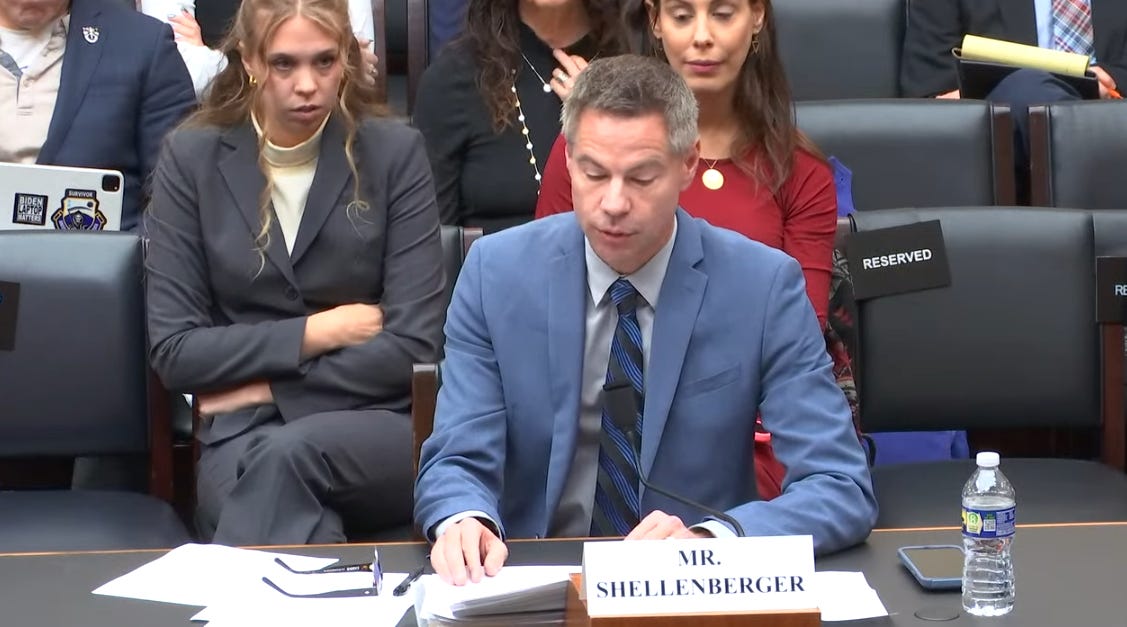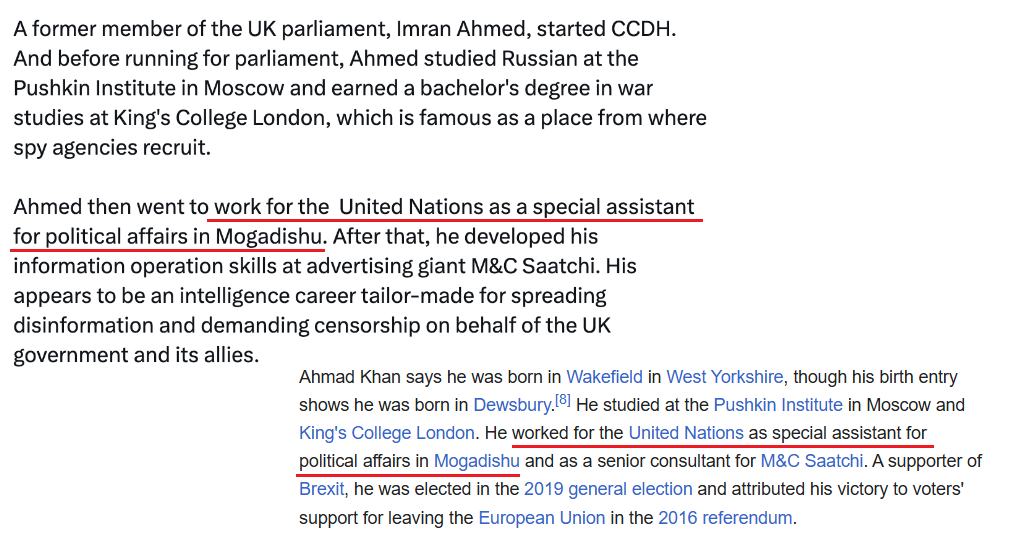Michael Shellenberger Mixed Up Two Guys With Sorta Similar Names And Falsely Told His Readers — And Congress — One Of Them Might Be A Spy As A Result
Not great
Since I published yesterday’s piece, I’ve heard from some people who are unhappy with the quality of Michael Shellenberger’s journalism over the years. The mere existence of accusations isn’t proof of anything, to be sure, but in some cases Shellenberger appears to have published false information in a cartoonishly sloppy manner.
In some instances, according to the allegations of his critics, Shellenberger has targeted individuals who he views as his political adversaries due to their work on issues pertaining to online misinformation and content moderation, and has smeared them with a mix of innuendo, misleading half-truths, and outright falsehoods.
It wasn’t very hard to find an example in which this indisputably occurred — and Shellenberger now admits it.
The example in question concerns the Center for Countering Digital Hate, a frequently cited organization that focuses on misinformation and hatred, “hold[ing social media companies] accountable and responsible for their business choices by highlighting their failures, educating the public, and advocating change from platforms and governments to protect our communities.” In my limited time looking into this organization, I’ve come away unimpressed, describing a report it published on incels (involuntary celibates) as “A Cherry-picked, Misleading Mess.” CCDH would not answer my questions about its methodology, which is never a good sign.
So I don’t really have any interest in defending the good honor of CCDH against Michael Shellenberger. But even if the CCDH were a literal Stalinist organization, that wouldn’t absolve journalists of their responsibility to report on it and its members honestly and accurately. And when Shellenberger went after Imran Ahmed, the organization’s founder, last year, he did so in a manner that reveals a staggering level of incompetence.
On September 5, 2023, Shellenberger and his Public senior editor Alex Gutentag published an article titled “Government Intel And Security Agencies Behind NGO Demands For More Censorship By X/Twitter.” They also posted it to Twitter (now deleted).
The article and tweets read, in part,
A former member of the UK parliament, Imran Ahmed, started CCDH. And before running for parliament, Ahmed studied Russian at the Pushkin Institute in Moscow and earned a bachelor’s degree in war studies at King’s College London, which is famous as a place from where spy agencies recruit.
Ahmed then went to work for the United Nations as a special assistant for political affairs in Mogadishu. After that, he developed his information operation skills at advertising giant M&C Saatchi. His appears to be an intelligence career tailor-made for spreading disinformation and demanding censorship on behalf of the UK government and its allies. [bolding mine]
Shellenberger and Gutentag are kinda-sorta accusing Imran Ahmed of being a spy, without providing any meaningful evidence of it — saying that someone got an undergraduate degree from a school “famous as a place from where spy agencies recruit” is sleazy, unless you have meaningful evidence to suggest they have meaningful ties to the intelligence community, and none of these biographical data points stand for much.
But the much bigger problem is that Shellenberger and Gutentag got the wrong guy. They confused Imran Ahmed, the founder of CCDH, with Imran Ahmad Khan, a disgraced former Conservative MP who was convicted of sexually assaulting a minor. If you read the latter’s Wikipedia page, you’ll see that all of the bolded biographical information Shellenberger and Gutentag attributed to Ahmed actually applies to Khan, and in some cases the language is so similar that it suggests (but doesn’t prove) Gutentag and Shellenberger copied and pasted from Wikipedia:
(That screenshot is of the current Wikipedia page, but the language in question doesn’t appear to have been changed since the version Shellenberger and Gutentag may have cribbed from.)
In his own response thread starting here, posted about eight hours after Shellenberger and Gutentag’s original accusations, Ahmed pointed out that Shellenberger’s screed was riddled with false claims about him — which makes sense in context, given that Shellenberger was accidentally talking about an entirely different guy. (Ahmed didn’t immediately return a request for comment submitted to the CCDH website.)
Apparently word never got to Shellenberger and Gutentag about this critically serious error. In late November, Shellenberger included his co-authored article — and its false claims about Khan — in a packet he submitted as testimony to the House Select Subcommittee on the Weaponization of the Federal Government (original version with the original language here). The report, which appears under the logo of Shellenberger’s organization Environmental Progress, is titled The Censorship-Industrial Complex, Part 2: U.S. and foreign government support for domestic censorship and disinformation, 2016–2022.
I reached out to Shellenberger earlier today to tell him he had mixed up the two men. “Thanks, Jesse. I’ll look into this and delete it if it’s wrong.” A little while later: “We corrected it on Substack and X and have emailed the congressional staffers about updating my testimony.” I asked if he was going to publish notice of the correction (no one reads year-old tweets or articles), and he didn’t immediately respond. He has since tweeted out a fresh version of the article — all the other allegations against named individuals and organizations intact and apparently not double-checked — with a correction on the bottom, and the original version of the article published on Public (which is paywalled) does have a correction at the bottom as well.
In both cases you have to scroll down all the way to see them, but I guess it’s better than nothing. (The communications directors of the ranking members of the House Subcommittee didn’t immediately return requests for comment.)
Shellenberger is treated as an expert on the subject of the “censorship industrial complex” — so much so that he was invited to testify before the aforementioned congressional subcommittee. To repeat what I said yesterday, his bio at the University of Austin describes him as a “leading expert on the suppression of speech.”
But it’s simply impossible for a competent journalist with genuine subject-area expertise to make a mistake this severe. To publicly accuse someone of maybe being a spy because you were too unfamiliar with his name to realize you were reading the wrong biography, and to then repeat that accusation in testimony submitted to Congress, is the act of a complete charlatan and an incompetent journalist.
Any reporter with a shred of self-respect who makes an error this grave, and who leaves that error up on multiple platforms for more than a year, will provide his readers with a lengthy explanation about how this occurred. It will be interesting to see whether or not Shellenberger does so.
Questions? Comments? Other well-documented examples of Michael Shellenberger unfairly smearing people? I’m at singalminded@gmail.com or on Twitter at @jessesingal. Image via YouTube/House Committee on the Judiciary.






Jesse, I hate to be the one to tell you this, but you seem to have conflated two people in this story as well.
Michael Shellenberger is a respected and careful journalist, however there's also a different guy also named Michael Shellenberger that makes baseless claims and sloppy journalistic errors. They both write for *Public*, both using the same byline. They also look identical and attend the same events but are never in the same room at the same time.
I think you owe (good) Michael Shellenberger an apology for confusing him with (bad) Michael Shellenberger.
There is a crisis in journalism in this country (and throughout the world). Michael Shellenberger is not the tip of that spear. Far from it. He has helped expose the disaster that mainstream journalism has become. So two hit pieces in a row on Shellenberger is really bizarre. Not to mention quite disproportionate to Shellenberger's influence in the MSM, which unfortunately is pretty negligible. Makes me curious what is behind this sudden interest in him.